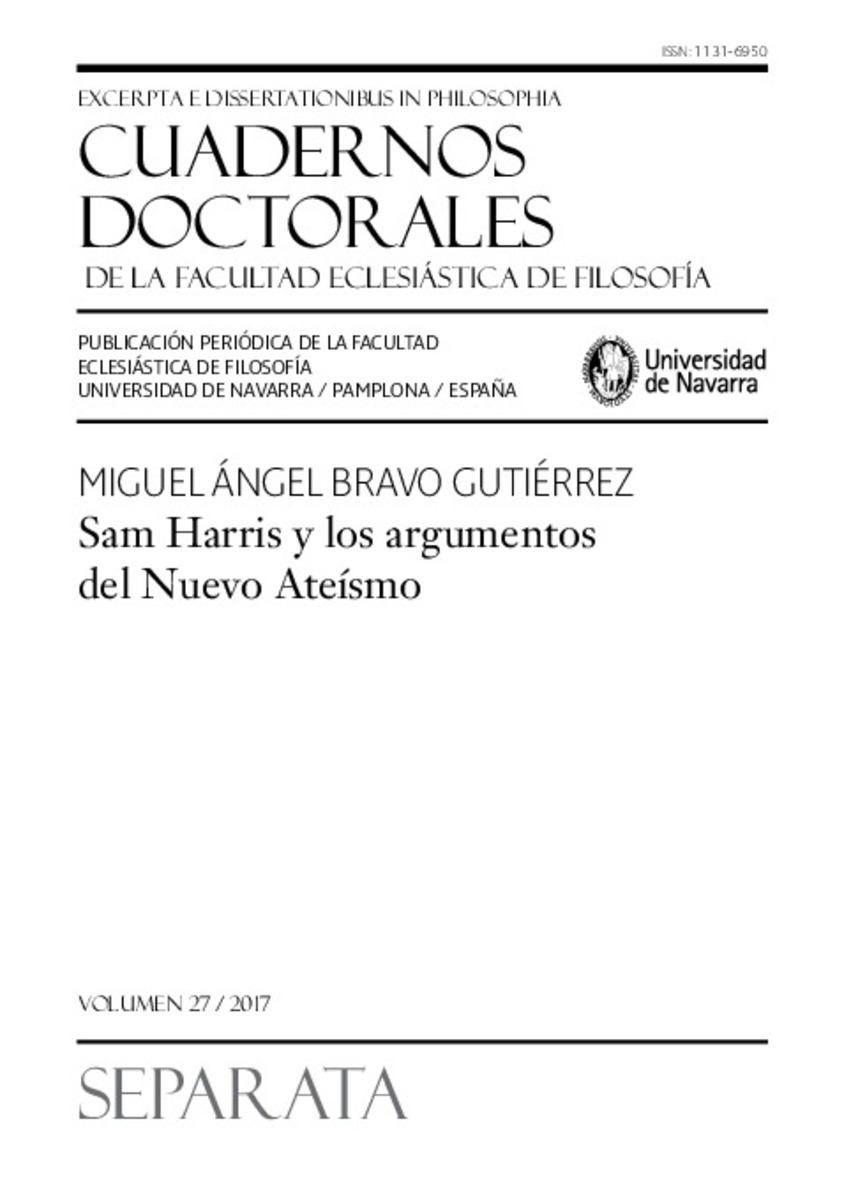Full metadata record
| DC Field | Value | Language |
|---|---|---|
| dc.creator | Bravo-Gutiérrez, M. A. (Miguel Ángel) | - |
| dc.date.accessioned | 2018-01-18T08:03:33Z | - |
| dc.date.available | 2018-01-18T08:03:33Z | - |
| dc.date.issued | 2017 | - |
| dc.identifier.citation | Bravo-Gutiérrez, M. A. (Miguel Ángel). "Sam Harris y los argumentos del Nuevo Ateísmo". Cuadernos Doctorales de la Facultad Eclesiástica de Filosofía. Excerpta e Dissertiationibus in Philosophia. 27, 2017, 185 - 291 | es |
| dc.identifier.issn | 1131-6950 | - |
| dc.identifier.uri | https://hdl.handle.net/10171/45910 | - |
| dc.description.abstract | Para Sam Harris cualquier manifestación religiosa es sinónimo de fanatismo y por lo tanto peligrosa y contraria al bienestar. Según este autor tampoco existe la libertad y el espíritu. Aquel que afirma la existencia del alma es un dualista, ya que solo tenemos el momento presente y la mejor manera de alcanzarlo es mediante la meditación budista y en algunas ocasiones incluso mediante el uso de drogas naturales o sintéticas que permitan prescindir del yo. Harris minusvalora cualquier conocimiento que no proceda directamente del método científico, como son, por ejemplo, las humanidades. A pesar de eso, es frecuente encontrar incluso argumentaciones que nada tienen que ver con la ciencia. El empleo indiscriminado del calificativo ‘científico’ no hace que un hecho sea más o menos verdadero. Esto evidentemente es un reduccionismo. | es_ES |
| dc.description.abstract | Sam Harris attempts to put the fundamentals of morality on the concept of well-being, far from any religious concept. For him, any manifestation of religiosity would be synonymous to fanaticism and therefore dangerous and would be against any kind of well-being. According to him, the concepts of free will and the spirit do not exist. Furthermore, those who support the existence of the human soul are dualists, since the only thing we have is the present moment and the best way to reach it is through buddhist meditation and at times even by the use of synthetic and natural drugs that allow us to leave out the self. Harris undervalues any kind of knowledge that does not come directly through the scientific method, like the humanities. Nevertheless, it is common to find in Harris’ texts argumentations that have nothing to do with science. The indiscriminate use of the word ‘scientific’ would not make a claim truer. This is obviously a reductionism. | es_ES |
| dc.language.iso | spa | es_ES |
| dc.publisher | Servicio de Publicaciones de la Universidad de Navarra | es_ES |
| dc.rights | info:eu-repo/semantics/openAccess | es_ES |
| dc.subject | nuevo atesímo | es_ES |
| dc.subject | cientificismo | es_ES |
| dc.subject | uso de drogas | es_ES |
| dc.subject | new atheism | es_ES |
| dc.subject | scientificism | es_ES |
| dc.subject | drug use | es_ES |
| dc.title | Sam Harris y los argumentos del Nuevo Ateísmo | es_ES |
| dc.type | info:eu-repo/semantics/article | es_ES |
| dc.publisher.place | Pamplona | es_ES |
| dadun.citation.endingPage | 291 | es_ES |
| dadun.citation.publicationName | Cuadernos Doctorales de la Facultad Eclesiástica de Filosofía. Excerpta e Dissertiationibus in Philosophia | es_ES |
| dadun.citation.startingPage | 185 | es_ES |
| dadun.citation.volume | 27 | es_ES |
Files in This Item:
Statistics and impact
Items in Dadun are protected by copyright, with all rights reserved, unless otherwise indicated.






